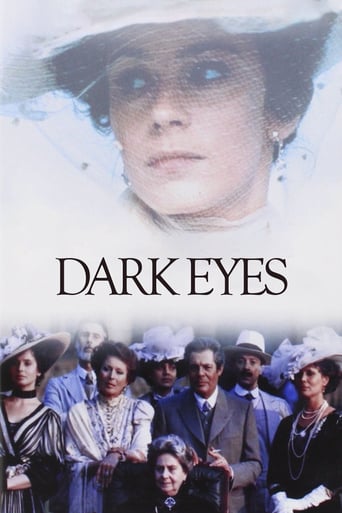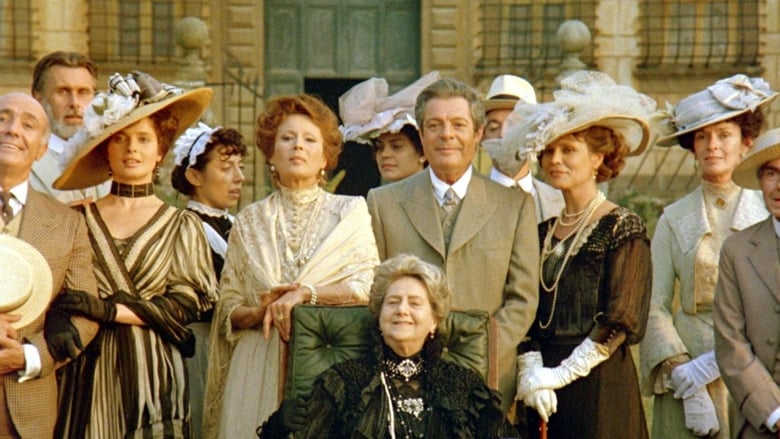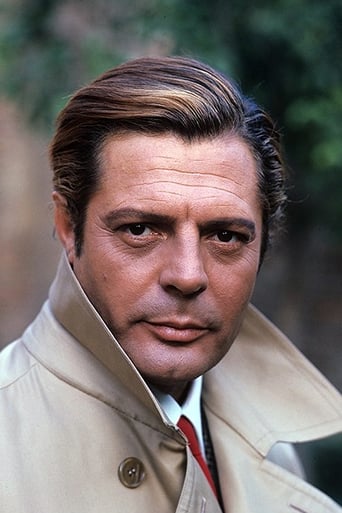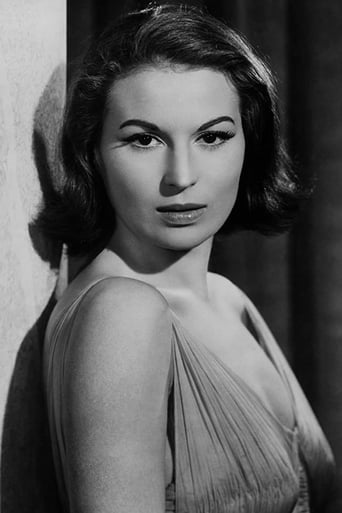

Dark Eyes (1987)
Aboard a ship early in the 20th-century, a middle-aged Italian tells his story of love to a Russian.
Watch Trailer
Cast


Reviews
A Russian/Italian co-production sounds like an uneasy marriage of mismatched temperaments, but 'Dark Eyes' is a remarkably cohesive mutual effort offering the best of both worlds: a wonderfully romantic story, a healthy love of laughter and high spirits, and a lingering air of Slavic melancholy. It's being sold as a showcase for the perennial charm of Marcello Mastroianni, but the film has more than just his performance to recommend it. The script, condensed from several tales by Anton Chekhov, has the elegant simplicity of a classic short story, following a charming but buffoonish husband in his pursuit of an attractive young Russian back to her native country, where he discovers a nation of people even crazier than he is. Some of the smaller roles have been drawn for the broadest effect, but under Nikita Mikhalkov's meticulous direction every character emerges as a full blooded human being, with Mastroianni himself offering a sensitive portrait of a man too in love with life to take it seriously. A nagging reservation: the final irony revealed in the epilogue adds one coincidence too many, and comes close to spoiling the already poignant mood. Just pretend it never happened.
Based (loosely) on Chekhov's story "The Lady With The Little Dog," Oci Ciornie (Dark Eyes) features some of the most sumptuous photography of recent years. Set in Yalta, a sultry Black Sea spa for stylish Russian idlers, Dark eyes features a memorable tragic-comic performance by Marcello Mastroianni as Romano, foolish, gallant, ultimately trivial, and a superbly innocent, deeply moving performance by Yelena Safonova as the woman whom he utterly, shamefully fails. Mikhalkov's script departs from the Chekhov story in ways that some Chiekhov-loving viewers might balk at. But Chekhov's ending is perhaps too subtle and introspective for cinematic realization, and Mikhalkov's alternative, seems justified, if only as a vehicle for Matroianni's extraordinary performance.
Whether this movie is based on, inspired by or just bears a passing resemblance to Chekhov's The Lady With The Little Dog is ultimately academic because what really matters is the movie as it stands, is it good, bad or ho-hum. It's actually rather good if anybody asks you. Sure, there are things that verge on hat of the very oldest kind, like the O'Henryish ending but the film transcends stuff like that easily. It begins with our old friend the Frame narrator buttonholing a passenger on a small cruise ship and laying his life-story on him. The information ladled out by the passenger - despite advancing years he is newly married; he had loved and pursued his wife for years; she in turn was unhappily married and could never love him but finally consented to marry him - over the length of the film is done so cunningly that only the professional film/story analyst will even sense a connection between this and the story told by Marcello Mastroianni, architect manque, married to Miss Gotrocks in the shape of Silvana Mangana, who is seized without warning by a passion for a Russian woman encountered by chance, so much so that he pursues her to her homeland and perseveres in the face of a burocray not unlike that encountered by Melvyn Douglas in HIS attempt to be reunited with Ninotchka, until he is finally able to travel to her small home town. The style is a hybrid of Chekhovian spareness and Visconti opulence but even this seems appropriate for a film determined to charm and seduce the discriminating viewer. Does it succeed? What do you think.
At first it seemed a terribly slow start. This was exacerbated by our mistaken notion that "Oci Ciornie" was just another title for "Urga" - we kept wondering when and how they would ever get to Mongolia in that boat!However, once we'd determined the actual story line the dilatory beginning seemed somehow apropos. Did Mikhalkov really mean to show us the emptiness of adultery? Or is he just an astute observer of the human condition? The parallels to the 1960 B&W "Lady with the Dog" (Russian) were striking. Especially the watermelon scene. But "Dark Eyes" takes the story further and carries the theme to its logical conclusion. My daughters hated it - they prefer stories of fidelity. But I did think it was refreshing for a film to come nearer the truth for a change. Adultery is not that fulfilling.




